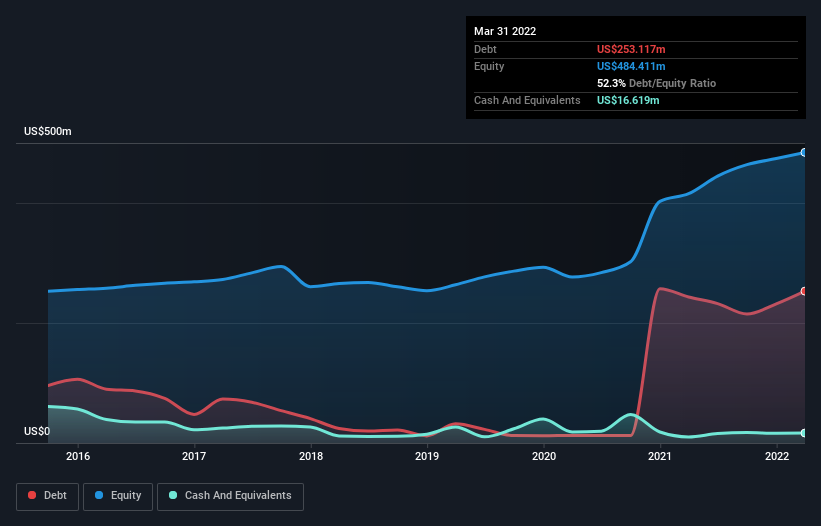Stock Analysis
- United States
- /
- Building
- /
- NasdaqGS:CSWI
These 4 Measures Indicate That CSW Industrials (NASDAQ:CSWI) Is Using Debt Safely

Some say volatility, rather than debt, is the best way to think about risk as an investor, but Warren Buffett famously said that 'Volatility is far from synonymous with risk.' It's only natural to consider a company's balance sheet when you examine how risky it is, since debt is often involved when a business collapses. As with many other companies CSW Industrials, Inc. (NASDAQ:CSWI) makes use of debt. But the real question is whether this debt is making the company risky.
When Is Debt Dangerous?
Debt and other liabilities become risky for a business when it cannot easily fulfill those obligations, either with free cash flow or by raising capital at an attractive price. In the worst case scenario, a company can go bankrupt if it cannot pay its creditors. However, a more usual (but still expensive) situation is where a company must dilute shareholders at a cheap share price simply to get debt under control. Of course, debt can be an important tool in businesses, particularly capital heavy businesses. The first thing to do when considering how much debt a business uses is to look at its cash and debt together.
See our latest analysis for CSW Industrials
What Is CSW Industrials's Debt?
As you can see below, at the end of March 2022, CSW Industrials had US$253.1m of debt, up from US$243.4m a year ago. Click the image for more detail. However, because it has a cash reserve of US$16.6m, its net debt is less, at about US$236.5m.

How Strong Is CSW Industrials' Balance Sheet?
We can see from the most recent balance sheet that CSW Industrials had liabilities of US$117.4m falling due within a year, and liabilities of US$393.5m due beyond that. Offsetting these obligations, it had cash of US$16.6m as well as receivables valued at US$122.8m due within 12 months. So it has liabilities totalling US$371.5m more than its cash and near-term receivables, combined.
This deficit isn't so bad because CSW Industrials is worth US$1.72b, and thus could probably raise enough capital to shore up its balance sheet, if the need arose. But we definitely want to keep our eyes open to indications that its debt is bringing too much risk.
We use two main ratios to inform us about debt levels relative to earnings. The first is net debt divided by earnings before interest, tax, depreciation, and amortization (EBITDA), while the second is how many times its earnings before interest and tax (EBIT) covers its interest expense (or its interest cover, for short). Thus we consider debt relative to earnings both with and without depreciation and amortization expenses.
CSW Industrials's net debt to EBITDA ratio of about 1.8 suggests only moderate use of debt. And its strong interest cover of 18.0 times, makes us even more comfortable. It is well worth noting that CSW Industrials's EBIT shot up like bamboo after rain, gaining 40% in the last twelve months. That'll make it easier to manage its debt. There's no doubt that we learn most about debt from the balance sheet. But it is future earnings, more than anything, that will determine CSW Industrials's ability to maintain a healthy balance sheet going forward. So if you want to see what the professionals think, you might find this free report on analyst profit forecasts to be interesting.
Finally, while the tax-man may adore accounting profits, lenders only accept cold hard cash. So we always check how much of that EBIT is translated into free cash flow. Over the most recent three years, CSW Industrials recorded free cash flow worth 74% of its EBIT, which is around normal, given free cash flow excludes interest and tax. This cold hard cash means it can reduce its debt when it wants to.
Our View
CSW Industrials's interest cover suggests it can handle its debt as easily as Cristiano Ronaldo could score a goal against an under 14's goalkeeper. And the good news does not stop there, as its EBIT growth rate also supports that impression! Looking at the bigger picture, we think CSW Industrials's use of debt seems quite reasonable and we're not concerned about it. While debt does bring risk, when used wisely it can also bring a higher return on equity. There's no doubt that we learn most about debt from the balance sheet. However, not all investment risk resides within the balance sheet - far from it. We've identified 1 warning sign with CSW Industrials , and understanding them should be part of your investment process.
If, after all that, you're more interested in a fast growing company with a rock-solid balance sheet, then check out our list of net cash growth stocks without delay.
Valuation is complex, but we're helping make it simple.
Find out whether CSW Industrials is potentially over or undervalued by checking out our comprehensive analysis, which includes fair value estimates, risks and warnings, dividends, insider transactions and financial health.
View the Free AnalysisHave feedback on this article? Concerned about the content? Get in touch with us directly. Alternatively, email editorial-team (at) simplywallst.com.
This article by Simply Wall St is general in nature. We provide commentary based on historical data and analyst forecasts only using an unbiased methodology and our articles are not intended to be financial advice. It does not constitute a recommendation to buy or sell any stock, and does not take account of your objectives, or your financial situation. We aim to bring you long-term focused analysis driven by fundamental data. Note that our analysis may not factor in the latest price-sensitive company announcements or qualitative material. Simply Wall St has no position in any stocks mentioned.
About NasdaqGS:CSWI
CSW Industrials
Operates as a diversified industrial company in the United States and internationally.
Excellent balance sheet with acceptable track record.

